牛津大学开放课程:哲学概论PPT讲义四
- 格式:pdf
- 大小:256.09 KB
- 文档页数:30
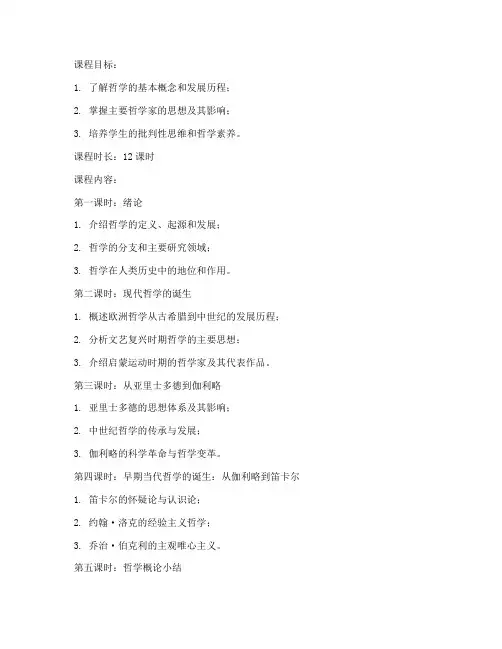
课程目标:1. 了解哲学的基本概念和发展历程;2. 掌握主要哲学家的思想及其影响;3. 培养学生的批判性思维和哲学素养。
课程时长:12课时课程内容:第一课时:绪论1. 介绍哲学的定义、起源和发展;2. 哲学的分支和主要研究领域;3. 哲学在人类历史中的地位和作用。
第二课时:现代哲学的诞生1. 概述欧洲哲学从古希腊到中世纪的发展历程;2. 分析文艺复兴时期哲学的主要思想;3. 介绍启蒙运动时期的哲学家及其代表作品。
第三课时:从亚里士多德到伽利略1. 亚里士多德的思想体系及其影响;2. 中世纪哲学的传承与发展;3. 伽利略的科学革命与哲学变革。
第四课时:早期当代哲学的诞生:从伽利略到笛卡尔1. 笛卡尔的怀疑论与认识论;2. 约翰·洛克的经验主义哲学;3. 乔治·伯克利的主观唯心主义。
第五课时:哲学概论小结1. 回顾本课程所涉及的主要哲学家和思想;2. 总结哲学的发展脉络和特点;3. 引导学生思考哲学在现代社会中的作用。
第六课时:汤玛斯·霍布斯导言1. 霍布斯的政治哲学与国家观念;2. 分析《利维坦》中的主要论点;3. 探讨霍布斯哲学对后世的影响。
第七课时:罗伯特·波义耳的微粒论1. 波义耳的化学哲学与实验科学;2. 分析波义耳的微粒论及其意义;3. 探讨微粒论对物理学的发展贡献。
第八课时:艾萨克·牛顿和工具主义1. 牛顿的物理学与哲学思想;2. 分析牛顿的万有引力定律和运动定律;3. 探讨牛顿哲学对科学方法的影响。
第九课时:约翰·洛克简介1. 洛克的哲学思想及其影响;2. 分析洛克的经验主义哲学;3. 探讨洛克对后世哲学家的启示。
第十课时:柏克莱与唯心主义1. 柏克莱的主观唯心主义哲学;2. 分析柏克莱的“存在就是被感知”观点;3. 探讨柏克莱哲学对后世的影响。
第十一课时:大卫·休谟简介1. 休谟的哲学思想及其影响;2. 分析休谟的经验主义哲学;3. 探讨休谟对后世哲学家的启示。

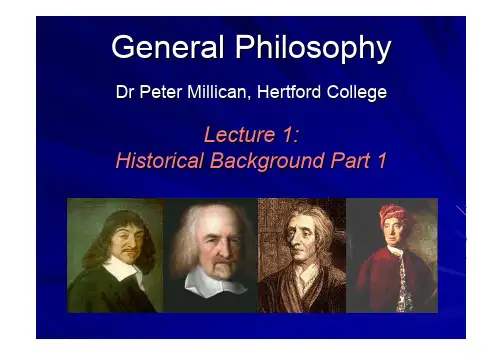
Lecture 1: Historical Background Part 1Some central issues of epistemology Illustrates how philosophy is done: typesHistorical focus: all but one of the topics (Knowledge) are introduced through thephilosophers of theHow the agenda got set: when and why did Learning the labels: “Cartesian dualism”,Great original thinkers, writing for a general audience: so their ideas are profound, and t take too much for granted.Philosophical ideas tend to have broad and Studying classic “battles of ideas” enablesMany classic themes recur throughout the history of thought, sometimes hidden under Ignoring the past can make us slaves of fashion, and blinker us to other options.Scepticism: Descartes’ evil genius, Locke’s veil of perceptionKnowledge: Responding to scepticism Perception: Locke’s representative theory of perception, BerkeleyPrimary and secondary qualities: Boyles criticisms Induction: Hume’s sceptical argument, and his denial that nature is “intelligible”Free Will: Hobbes’ and Hume’s compatibilism, and their naturalistic view of Mind and Body: Descartes’ dualism,Personal Identity: Locke’s attempt toThe ancient Greeks, distinctively,Many different philosophers and “schools”:(335 BC -)Stoics (c. 300 BC -)Roman Empire became Christianised: Plato and Aristotle adopted:Christian Aristotelianism (e.g. Aquinas 1225-74) The Christian Aristotelian worldview became dominant in the medieval monastic schools, hence “Scholasticism”.MercuryMoon FireAirWater& EarthVenusSunMars SaturnFixed StarsAristotle ’s UniverseAncient texts survived in the ByzantinePrinting (invented 1450) gave them much(rediscovered 1417, printed 1486)(translated into Latin 1562)Many factors contributed to WesternThe Reformation added to this crisis:at Westphalia, 1648 led to greater religious toleration.A sceptical problem raised by SextusHow can any criterion of reliable knowledge be chosen, unless we already have somereliable criterion for making that choice?How to know who is right? (Maybe neither?!)Elements and Natural MotionsA Teleological Physics heavenly bodies move in circles, and must beaether .?“Why does water rise up a siphon pipe?”“Why does opiumMolière (1673)Aristotle couldn’t explain:Galileo was reported (by Viviani) to havedropping a large and a small ball together from the Leaning Tower of Pisa. Contrary toAristotle, they fell at similar speeds.The telescope was invented in Holland in What he saw with it refuted Aristotle’sInnumerable stars too dim for the naked eye;Phases of Venus, sometimes “full” (implying that it is then on the opposite side of the Sun).SunVenus EarthVenus as considered by PtolemyAristotelian science was based on Galileo preferred “efficient” causation:inert, remaining in its state of motion or rest unless acted on.The paradigm of efficient causation is via Compared with pseudo-explanationsvacuum, dormitive virtue etc.), this seems:Thus Galileo claimed, against Aristotle:BUT: why then does the Moon orbit the Earth, and the planets orbit the Sun?Attacks Aristotlian tradition Builds on Galileo’sMakes room for mind“essence” radically distinct from matter.Seeks reliable anti-sceptical basis forA perfect God cannot deceive, so our facultiesHence the importance of Descartes’Method.Descartes was a major natural philosopher:His most important intellectual legacy: The ideal of a mechanistic science of the world, based on the simple mathematical properties of extended matter.The real qualities of matter follow from itsextensionpassives) are observer-dependent. Mind is a distinct, active immaterial substance, whose essence is thinking.Since matter’s essence is extension, non-A vortex can explain why the planets orbit theSun without shooting off under inertia.。
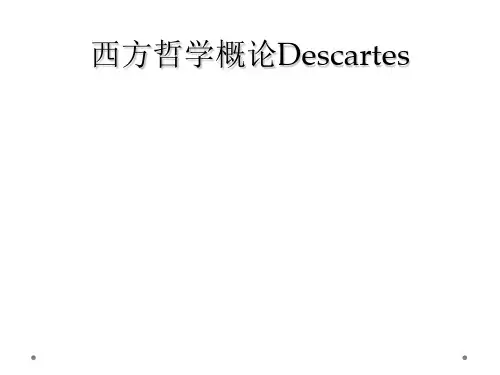
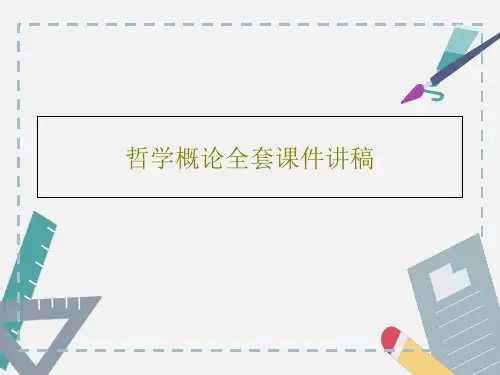
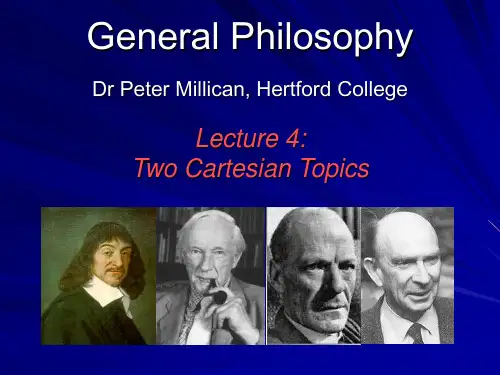
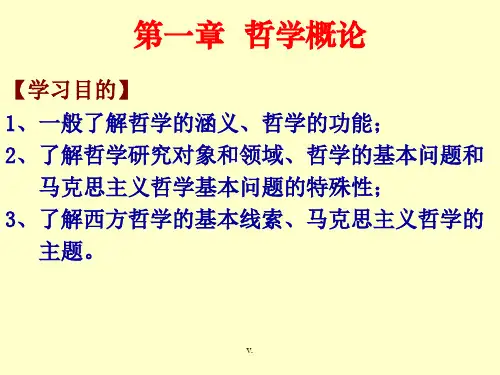
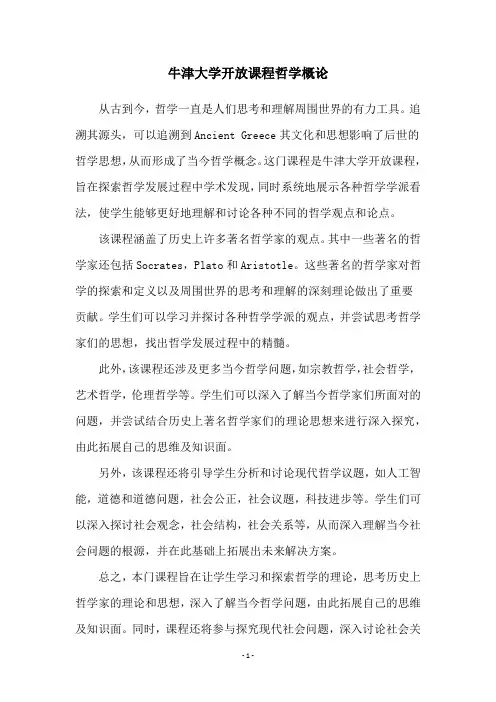
牛津大学开放课程哲学概论
从古到今,哲学一直是人们思考和理解周围世界的有力工具。
追溯其源头,可以追溯到Ancient Greece其文化和思想影响了后世的哲学思想,从而形成了当今哲学概念。
这门课程是牛津大学开放课程,旨在探索哲学发展过程中学术发现,同时系统地展示各种哲学学派看法,使学生能够更好地理解和讨论各种不同的哲学观点和论点。
该课程涵盖了历史上许多著名哲学家的观点。
其中一些著名的哲学家还包括Socrates,Plato和Aristotle。
这些著名的哲学家对哲学的探索和定义以及周围世界的思考和理解的深刻理论做出了重要
贡献。
学生们可以学习并探讨各种哲学学派的观点,并尝试思考哲学家们的思想,找出哲学发展过程中的精髓。
此外,该课程还涉及更多当今哲学问题,如宗教哲学,社会哲学,艺术哲学,伦理哲学等。
学生们可以深入了解当今哲学家们所面对的问题,并尝试结合历史上著名哲学家们的理论思想来进行深入探究,由此拓展自己的思维及知识面。
另外,该课程还将引导学生分析和讨论现代哲学议题,如人工智能,道德和道德问题,社会公正,社会议题,科技进步等。
学生们可以深入探讨社会观念,社会结构,社会关系等,从而深入理解当今社会问题的根源,并在此基础上拓展出未来解决方案。
总之,本门课程旨在让学生学习和探索哲学的理论,思考历史上哲学家的理论和思想,深入了解当今哲学问题,由此拓展自己的思维及知识面。
同时,课程还将参与探究现代社会问题,深入讨论社会关
系及社会结构,并拓展出可行的解决方案,以解决未来的社会问题。
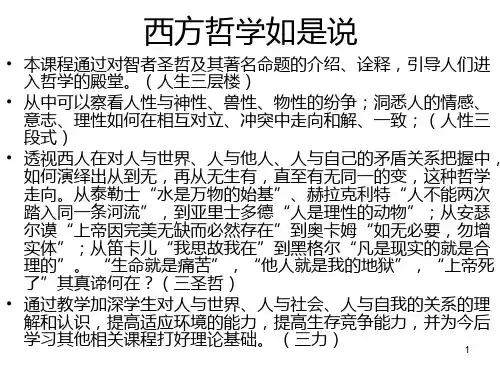

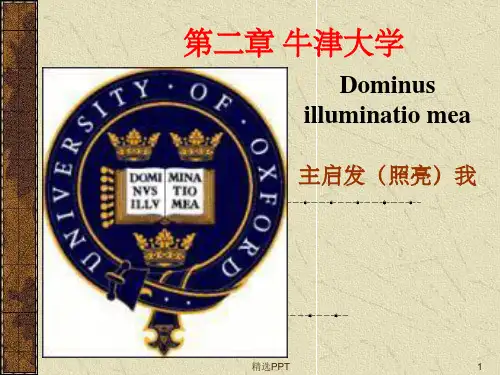
牛津大学哲学,政治和经济学课程简介学校名称:英国牛津大学 University of Oxford所在位置:英国QS排名:5哲学,政治和经济学专业汇集了一些最重要的方法来理解我们周围的世界,培养对各种职业和活动有用的技能。
为您悉心翻译了2019年牛津大学哲学,政治和经济学专业本科申请条件,看看你是否符合吧,欢迎阅读。
1.证书中国留学生需已获得高中毕业证书。
2. 英语成绩3.其他要求A级:AAAIB课程:39分(包括核心点)(Higher Level考试中分数分别为7分、6分和6分)或其他任何同等资格(请参阅其他英国资格和国际资格证书),您可以申请在学校完成任何科目组合的PPE; 没有必要是一定学习政治,哲学或经济学。
历史和数学是有用的背景,但不是必需的。
我们希望你已经在你选择的科学科目中接受并通过了任何实用的组成部分。
虽然数学背景没有正式被要求入学,但PPE申请人应该对数学有足够的兴趣和能力来应对课程的数学要素。
数学是本课程经济学部分以及哲学第一年逻辑课程以及理解政治理论和数据的一个特别优势。
许多成功的申请者都对数学进行了学习,至少达到了AS水平,或者其他相当的水平。
即使您没有进一步追求,您也可能会考虑将数学考入AS水平或具有相当资格(如IB标准水平)。
在PPE开始你的大学课程之前,学习差异化基础知识是有用的。
所有考生还必须将思维技能评估(TSA)作为其申请的一部分。
请参阅如何申请更多详情。
【阅读更多:2019年牛津大学本科各专业申请条件汇总】学习哲学,你将发展严谨的分析和逻辑批判和推理的能力,并且能够将这些技巧运用到有关我们如何获得知识或做出道德判断的问题上。
政治学研究提供了对政治制度对现代社会影响的透彻理解。
它可以帮助您评估政治系统必须定期做出的选择,解释维护或改变这些系统的过程,并检查政治分析中使用的概念和价值。
经济学研究消费者,企业和政府如何制定决策、共同决定如何分配资源。
对经济学的认识越来越有必要了解政府的政策制定,企业的行为以及世界各地巨大的经济转型。
牛津大学(University of Oxford)位于英国牛津市,是英语世界中最古老的大学。
虽然牛津大学的确切创立日期仍不清楚,但其历史可大约追溯到十二世纪末,迄今约有900年。
1209年,在牛津学生与镇民的冲突事件过后,一些牛津的学者迁离至东北方的剑桥镇,并成立剑桥大学。
自此之后,两间大学彼此之间展开相当悠久的竞争岁月。
牛津大学还是英国名校集团罗素盟校,欧洲科英布拉集团,欧洲研究型大学LERU (League of European Research Universities)以及Europaeum中的核心成员。
牛津大学具有世界声誉,它在英国社会和高等教育系统中具有极其重要的地位,有着世界性的影响。
英国和世界很多的青年学子们都以进牛津大学深造作为理想。
讲师:Marianne Talbot
课程:批判性推理入门
讲师:Bernard Reginster
课程:尼采的心灵与自然
讲师:Peter Millican 课程:哲学概论。
Lecture 4:Two Cartesian TopicsLast Time …This Lecture …claims about the nature of MIND AND BODY. The Next Lecture …will say more about modern responses to SCEPTICISM, and focus on KNOWLEDGE.Vertical ScepticismHorizontal Scepticismas one has sensations or appearances, to expect similar sensations or appearances in the future).It can seem that (“vertical”) external worldMaybe a wicked scientist has my brain in a vat, and is creating these illusions.The only way to defeat scepticism is to When I consider “I think, therefore I am”, itBy contemplating this first certainty, I understand what makes it certain is that I clearly and distinctly perceive it to be true.Hence I can establish as a general rule I clearly and distinctly perceive that GodA perfect God cannot deceive, so I know that my faculties are essentially reliable.Descartes seems to be “boot-strapping”:Isn’t this viciously circular?If my faculties might be defective, then howcan I trust my proof of the existence of God in the first place? How can any anti-scepticalargument even get off the ground?G.E. Moore famously claimed to refute thisModus PonensP is true Ptherefore Q is trueModus TollensQ is false¬Q therefore P is false¬PThe religious fundamentalist might say: Everything in the Bible is true.The humane philosopher would say:Genocide is never desirable.Therefore not everything in the Bible is true. Which underlined premise is more plausible?Moore says:We know this is a hand .The sceptic says:We don ’t know that there is an external world .t know that this is a hand.Moore will claim that his premise is moreWe’d like to agree with Moore, but it seemsBut “internalist” arguments, like CartesianSo many recent philosophers have moved towards externalism (next lecture, ands approach to induction).The view for which Descartesimmaterial substance This substance dualism is to be contrasted(i.e. there are both physical and non-physical properties).In his Discourse, Descartes argues like this: Compare:I cannot doubt that Phosphorus is Phosphorus.Hesperus = the Evening Star; Phosphorus = the Morningboth are appearances of the planet Venus.If a and b are the same thing, then anybeing doubted by me to exist me my bodybeingdoubted by me to be Prime MinisterTo simplest way to avoid the fallacy is to deny that these are genuine properties.Descartes’ argument in Meditation VI is lessAnything I clearly and distinctly understand could So I could exist separately from my body, and it follows that I am genuinely distinct from it.Even in the Meditations, Descartes tries tosense only a thing that thinks; that is, I am a mind, or intelligence, or intellect, or reason …a thinking thing.The way in which we come to know, or be From I am thinking, it plausibly follows that (in at least one sense) I am a thing that thinks.necessarily follow that I amsomething whose essence is to think.could exist without being extended. (Imagine if a piece of matter were made able to think.)The final move of Descartes’ argument God could have created my mind and body It is possible for my mind and body to existMy mind and body are in fact distinct things. But “could have” must be metaphysicalepistemology (“might have”). So this begs the question.“How can two such distinct substanceson a Humean view ofcould bebetween physical and mental).The causal closure principle is that physicalCommonly believed, though its evidentialThe causal closure principle seems to Even if we deny the principle, mind/bodyIt’s hard to see how an immaterial mindalongside the body.all or nothing”?InteractionismEpiphenomenalismPhysicalismOnly physical things exist, hence there isnothing to the mind beyond the physical brain.Imagine a scientist (Mary) who learns all the If she then acquires normal sight, when shesees colours she learns what they look like,Hence these phenomenal colour properties cannot be physical. We are forced intodualism, if not substance dualism.What are the properties of physical matter?.: mind is a fundamental featurephysical?!Physicalism generally shuns such “spooks”.Even with “non-spooky” physicalism, itfacts, not Likewise evolutionary explanation etc. (e.g. in terms of the logic of game theory).It is tempting to see the relation betweenExplains away another Cartesian argument:Body and mind are distinct.The classic category mistake:“Mind” as a category mistake:”just is a matter of hows not a separate thing.If one does think of the mind as a separate How can I know my brain isn’t linked tot be certain, but it s an However Strawson would probably see even the possibility as a reductio ad absurdum.Physicalism can comfortably accommodate: But the “hard problem” (Chalmers) remains:phenomenalconsciousness (i.e. conscious experience)? Can this justify substance dualism after all?Or should we rather admit that we simply don’t (yet) understand it? Maybe we never will!。